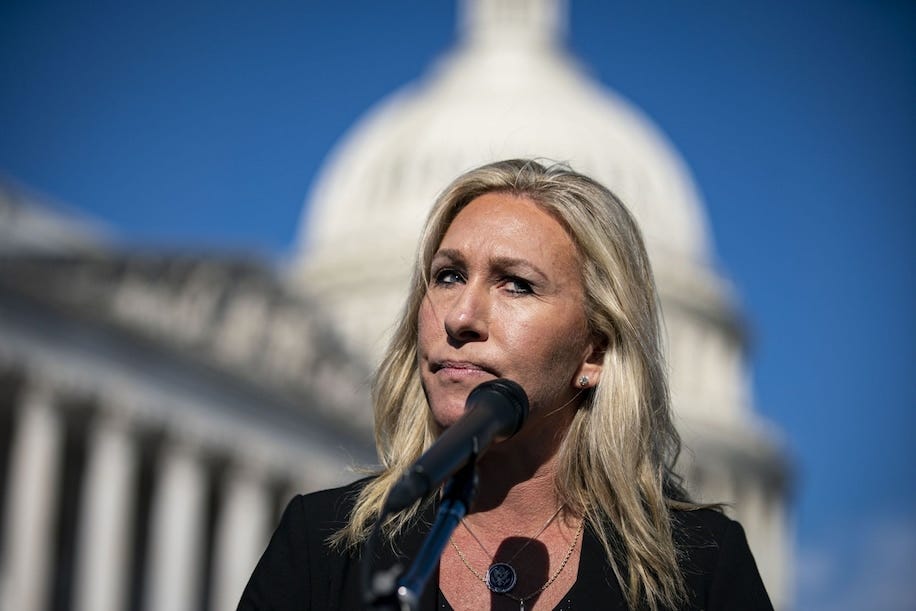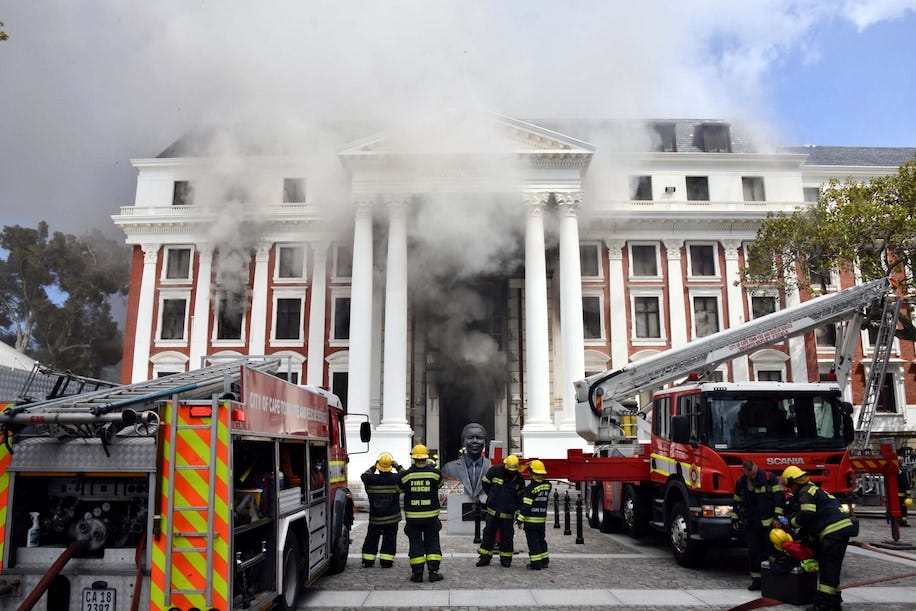The Full Belmonte, 1/3/22
Rep. Marjorie Taylor Greene, a Republican representing Georgia, retains access to her congressional Twitter account. (Al Drago/Bloomberg News)
“Twitter has permanently suspended the personal account of Rep. Marjorie Taylor Greene (R-Ga.), saying Sunday that the congresswoman repeatedly violated the company’s covid-19 misinformation policy.
The suspension came hours after she published a tweet falsely suggesting ‘extremely high amounts of Covid vaccine deaths.’ Included was a chart featuring data from the Vaccine Adverse Event Reporting System, which details self-reported post-vaccine health issues that the Centers for Disease Control and Prevention warns do not imply causation.
The congresswoman’s verified personal account had been temporarily suspended two times over the summer. In July, she lost access for 12 hours after falsely claiming that the coronavirus was ‘not dangerous for non-obese people and those under 65.’ A month later, she faced a week-long suspension after falsely tweeting that the coronavirus vaccines were ‘failing.’
Twitter on Sunday cited a ‘strike’ system for violations of its covid policy, which bars users from sharing content that is ‘demonstrably false or misleading and may lead to significant risk of harm.’ Five or more strikes lead to a permanent suspension.
‘We’ve been clear that, per our strike system for this policy, we will permanently suspend accounts for repeated violations of the policy,’ Katie Rosborough, a company spokeswoman, said in an email to The Washington Post.
Responding via a statement on the messaging app Telegram, Greene lambasted Twitter, saying it ‘is an enemy to America and can’t handle the truth. That’s fine, I’ll show America we don’t need them.’ She shared the message through other social media outlets where she has a presence, including Gettr, a conservative-friendly site led by former Donald Trump adviser Jason Miller.
On Twitter, Greene maintains access to her congressional account, @RepMTG, as it is not in violation of company policies, Rosborough confirmed. The congresswoman’s most recent tweet from that account was a Dec. 24 video wishing her followers a merry Christmas.
Twitter has rules intended to limit the spread of misinformation on the site. Under those rules, misleading claims that could cause significant confusion or harm are subject to removal, labels or other actions.
Last year, the company permanently banned President Donald Trump, days after a mob of his supporters stormed the U.S. Capitol. The social media site had long resisted action against his posts, arguing that a world leader should be able to communicate with the public. But after the Jan. 6 attack on the Capitol, Twitter said the risk of further violence compelled it to act.
Greene’s rise has been marked by extreme rhetoric online and off, as well as support for QAnon, a baseless conspiracy theory positing that Trump is working to take down a cabal of ‘deep state’ saboteurs who traffic children for sex. She was elected in 2020 by voters in Georgia’s reliably conservative 14th Congressional District, in an ascent that worried some GOP officials.” Read more at Washington Post
“WASHINGTON — The anniversary of the Jan. 6 riot arrives this week with the congressional committee investigating the attack confronting a series of difficult questions, including how forcefully to flex its subpoena power and whether the Supreme Court will stymie a major element of its inquiry.
As the nine-member panel continues to examine the events leading up to the worst attack on Congress in centuries, it is waiting to see whether the Supreme Court will refuse a request from former President Donald J. Trump to block the committee’s access to White House records related to the riot. The committee also has not ruled out moving to subpoena members of Congress, or Mr. Trump and former Vice President Mike Pence.
Thursday will mark a year since a mob of Trump supporters stormed the building, determined to disrupt the formal certification of President Biden’s electoral victory. At least seven people died in connection with the riot, dozens more were injured and hundreds of workers in the Capitol were shaken and traumatized, further fracturing an increasingly partisan Congress.
The committee, aiming to release a final report before the November midterm elections, is planning for a more public stage of its investigation in the coming weeks as lawmakers work to trace the planning of the attack and expand the scope of the investigation. Representative Adam B. Schiff, Democrat of California and a member of the panel, said on Sunday on CBS’s ‘Face the Nation’ that public hearings could begin ‘in a matter of weeks, if not a couple of months from now.’
But as the inquiry continues, the first anniversary will draw even more attention as lawmakers, staff members, Capitol employees and journalists commemorate the day. Both Mr. Biden and Vice President Kamala Harris are scheduled to give speeches marking the anniversary.
While the House is not scheduled to return for legislative work until Jan. 10, Speaker Nancy Pelosi of California has mapped out events for lawmakers to participate in on Thursday, either in Washington or virtually from their districts, in what she described as ‘an observance of reflection, remembrance and recommitment.’
The House will hold a moment of silence before Dr. Carla Hayden, the librarian of Congress, moderates a discussion with historians ‘to establish and preserve the narrative of Jan. 6,’ Ms. Pelosi wrote in a letter to her caucus. Lawmakers will give speeches reflecting on the day, and lawmakers will hold an early evening prayer vigil on the center steps of the Capitol.
Unlike the House, the Senate is scheduled to be in session this week as Democrats continue confirming Biden administration nominees and seek to revive their party’s stalled legislative agenda. Senator Chuck Schumer of New York, the majority leader, is expected to invoke the riot and efforts by Trump loyalists to overturn the 2020 election as he pushes to pass a voting rights overhaul and try to change Senate rules to overcome a Republican filibuster against that legislation.
The Senate Rules Committee will hold an oversight hearing with J. Thomas Manger, the Capitol Police chief, on Wednesday. On Thursday, however, it is likely that some senators may be in Atlanta to attend an afternoon memorial service for former Senator Johnny Isakson, a Georgia Republican who died in December.
Some lawmakers have questioned whether it was appropriate for Congress to be in session, given the lingering trauma from the day.
“It was a sad day in our nation’s history, and a terrible day, and I don’t think bringing a lot of attention to the day is a great idea,” said Senator Susan Collins of Maine, one of seven Republicans who voted to convict Mr. Trump after he was impeached for his role in inciting the mob that day. “For some of the staffers,” she added, “for some of the Capitol Police officers, it brings back a lot of trauma, and I just think it’d be better if we aren’t here.”
A majority of Republicans, however, have sought to downplay the attack. They have largely refused to acknowledge their party’s complicity in failing to quash Mr. Trump’s lies about the election and cut ties with the former president, who continues to peddle conspiracy theories rather than accept his electoral loss.
‘Our party has to choose,’ Representative Liz Cheney of Wyoming, the vice chairwoman of the Jan. 6 committee and one of two Republican panel members, said Sunday on ‘Face the Nation.’ ‘We can either be loyal to Donald Trump or we can be loyal to the Constitution, but we cannot be both. And right now there are far too many Republicans who are trying to enable the former president.’
Representative Kevin McCarthy of California, the minority leader, emphasized his party’s opposition to the riot in a letter to House Republicans, although he did not mention the former President.
‘As we have said from the start, the actions of that day were lawless and as wrong as wrong can be,’ he wrote. ‘Our Capitol should never be compromised and those who broke the law deserve to face legal repercussions and full accountability.’ But he rebuked Democrats, accusing them of ‘using it as a partisan political weapon to further divide our country.’” Read more at New York Times
“2021 was Chicago's deadliest year for homicides in 25 years — since 1996. Other New Year's weekend headlines from around the country:
L.A. Times: ‘L.A. gun deaths most in 15 years.’
Washington Post: ‘Killings rocketed in Md. suburbs and D.C. in 2021.’
Philadelphia Inquirer: ‘14 shot in Philly as new year begins.’
Atlanta Journal-Constitution: ‘With 158th homicide, city passes 2020 total.’
Portland Oregonian: ‘The city feels lawless.’
Minneapolis Star Tribune: ‘Mpls. nears homicide record.’
San Jose Mercury News: ‘Oakland ends a deadly 2021 ... City's homicides hit a 15-year high.’
Cleveland Plain Dealer: ‘Suburban Cleveland ... Homicides up 29% in 2021 from a year ago.’
New Orleans Times-Picayune: ‘Murder toll the highest since 2004.’” Read more at Axios
“Many of the nation's schools are opening today with in-person classes. But more than 2,100 will be closed or open only for remote instruction this week, Axios health care editor Tina Reed writes.
Major school districts, including D.C. and Baltimore, extended the holiday break by a few days to allow time to test students and teachers.
Some smaller districts — including ones in Michigan, Ohio and New Jersey — imposed remote learning for this week.
Mask requirements are back in some districts that had dropped them. Many schools will vastly ramp up testing of students and staff. (AP)
What's happening: Pediatric hospitalizations have hit record levels, attributed mostly to large numbers of kids not being fully vaccinated.
Early data continues to indicate Omicron may not cause much severe illness. ‘Given the large number of cases, we have not seen a concomitant increase in the relative percentage of hospitalizations,’ Dr. Anthony Fauci told ABC's ‘This Week’ yesterday.
What we're watching: The Biden administration is sticking with its push to keep schools open, although its ‘test-to-stay’ plan has faced complications, including delayed tests.
Education Secretary Miguel Cardona said on CBS' ‘Face the Nation’: ‘I ... believe very firmly and very passionately, not only as an educator but as a parent, that our students belong in the classroom and that we can do it safely.’
Fauci pointed to vaccination rates among teachers, growing vaccinations among kids and increased testing: ‘I think all those things put together, it's safe enough to get those kids back to school, balanced against the deleterious effects of keeping them out.’
The bottom line: As the U.S. gets back to business and school in '22, Americans face increased testing, changing isolation protocols, and evolving views on mask quality.” Read more at Axios
“Defense Secretary Lloyd Austin, 68, announced he tested positive for COVID yesterday after feeling mild symptoms, and will quarantine at home for five days:
‘As my doctor made clear to me, my fully vaccinated status — and the booster I received in early October — have rendered the infection much more mild than it would otherwise have been.’” Read more at Axios
Antonio Brown's tenure with the Buccaneers ended with Sunday's bizarre incident. (Elsa/Getty Images)
“The controversies continued Sunday for wide receiver Antonio Brown, as he wore out his welcome with another NFL team by shedding his Tampa Bay Buccaneers uniform during a game against the New York Jets in East Rutherford, N.J., and walking off the field shirtless.
Coach Bruce Arians said after the game that Brown would not remain with the organization.
‘He is no longer a Buc, all right?’ Arians said during his postgame news conference. ‘That’s the end of the story. Let’s talk about the guys that went out there and won the game.’
The strange saga of Brown’s tempestuous NFL career just kept getting stranger.
With the defending Super Bowl champions facing the hapless Jets at MetLife Stadium, the mercurial wide receiver tossed aside his Buccaneers jersey and shoulder pads along the sideline. Brown then threw pieces of his equipment into the stands and left the field….
Brown, 33, was not available to comment. He was playing his second game for the Buccaneers since serving a three-game suspension imposed by the NFL for misrepresenting his vaccination status. Brown submitted a fake vaccination card but subsequently was legitimately vaccinated, a person familiar with the findings of the league’s review said at the time.
Buccaneers safety Mike Edwards and free agent wide receiver John Franklin III, who’d formerly been with the team, were given identical penalties for the same infraction.
Arians allowed Brown to rejoin the team even though he’d said when the Buccaneers signed Brown last season — as Brown completed an eight-game suspension by the league for violating the NFL’s personal conduct policy — that Brown would be allowed only one misstep in Tampa….
Brown — once among NFL’s most productive receivers for the Steelers — never played a game for the Raiders, then based in Oakland, after being traded there before the 2019 season.
He was released by the Raiders, at his request, after a series of incidents that included a practice-field verbal confrontation with General Manager Mike Mayock. Brown also missed time because of injuries to his feet suffered while undergoing cryotherapy treatments and because of two failed grievances against the NFL as he sought to be permitted to wear a helmet not up the safety standards of the league and the NFL Players Association.
The Patriots signed Brown during the 2019 season after he was released by the Raiders, but they released him after one game amid mounting allegations of off-field misconduct. Brown pleaded no contest in 2020 to charges in Florida related to an incident involving a moving truck. He was sentenced to probation and community service.
The eight-game suspension imposed by the NFL was independent of allegations of sexual assault made against Brown by Britney Taylor, a former college classmate who later worked for him as a trainer. Brown denied the accusations and reportedly reached a settlement with Taylor last year.
Even amid the chaos Sunday created by Brown’s departure, the Buccaneers overcame a 24-10 deficit to beat the Jets, 28-24.” Read more at Washington Post
“K-12 schools press to reopen as Omicron surges. Thousands of U.S. schools have announced that they will be closed starting Monday, but others have made tentative plans to bring students back to the classroom this week after the winter break. Their biggest challenge: getting enough rapid tests to be able to step up or launch ‘test-to-stay’ strategies.” Read more at Wall Street Journal
“For millions of American families with children, the 15th of the month took on a special significance in 2021: It was the day they received their monthly child benefit, part of the Biden administration’s response to the pandemic.
The payments, which started in July and amounted to hundreds of dollars a month for most families, have helped millions of American families pay for food, rent and child care; kept millions of children out of poverty; and injected billions of dollars into the U.S. economy, according to government data and independent research.
Now, the benefit — an expansion of the existing child tax credit — is ending, just as the latest wave of coronavirus cases is keeping people home from work and threatening to set off a new round of furloughs. Economists warn that the one-two punch of expiring aid and rising cases could put a chill on the once red-hot economic recovery and cause severe hardship for millions of families already living close to the poverty line.” Read more at New York Times
“Supreme Court to hear oral arguments on Covid-19 vaccine rules. In response to a growing pile of emergency appeals asking the justices to intervene, the high court will hold a special sitting on Friday to determine whether the Biden administration can enforce vaccine requirements for large private employers and healthcare workers.” Read more at Wall Street Journal
“Armed with her vaccine passport and a giddy urge to celebrate the holiday season, Laura Delgado — and 60,000 other people in Puerto Rico — attended a Bad Bunny concert three weeks ago.
Three days later, she was sick with Covid-19, one of about 2,000 people who fell ill as a result of the two-day event.
‘We did so well; we followed the rules,’ said Ms. Delgado, a 53-year-old interior designer. ‘We followed the mask mandate. Our vaccination rate was so high that we let our guard down. The second Christmas came, we were like, ‘We’re going to party!’
The superspreader concert helped usher in an explosion of Covid-19 cases in Puerto Rico, which until then had been celebrating one of the most successful vaccination campaigns in the United States. The concert was one of a series of business events, company holiday parties and family gatherings that fueled a 4,600 percent increase in cases on the island, a surge that public health officials worry could linger into the New Year; the Puerto Rican holiday season stretches to Three Kings Day on Jan. 6.
While the Omicron variant has besieged the entire country, it is especially worrisome in Puerto Rico, a U.S. territory already overwhelmed by government bankruptcy, an exodus of health professionals and a fragile health care system. Officials imposed a new wave of tough restrictions on travelers and diners in hopes of staving off the new wave of cases.” Read more at New York Times
“Democrats seek filibuster changes to pass elections bills. The Senate returns on Monday with Democrats focused on trying to change the chamber’s rules to muscle through elections legislation over Republican opposition, as lawmakers also hope to revive President Biden’s stalled economic and climate agenda.” Read more at Wall Street Journal
“Job gains expected despite latest Covid-19 wave. Labor Department figures due Friday are projected to show employers added 405,000 jobs in December and the unemployment rate ticked down to 4.1%, according to economists. The report comes even as forecasters are lowering their estimates of economic growth.” Read more at Wall Street Journal
“The White House on Monday announced it will devote $1 billion to aiding independent meat and poultry producers, aiming to undercut the four powerful meat producers the Biden administration has alleged are responsible for surging consumer prices.
Facing immense political pressure over inflation, the White House has responded in recent weeks by criticizing large corporations and arguing that breaking up monopolies will foster competition and drive down prices. In November, President Biden asked the Federal Trade Commission to look into whether oil and gas companies were improperly pushing up energy prices.
The stakes are particularly high in the beef industry, where prices in November rose by a staggering 21 percent relative to last year, according to federal data. Food prices have also increased more broadly — by a significant 6.4 percent — with the index for meat, poultry, fish and eggs jumping 13 percent.” Read more at Washington Post
“Rollout of new 5G services could cause further flight disruptions. More than 6,000 flights were canceled in the U.S. this weekend due to winter storms and coronavirus-related staffing problems. Airlines could face another challenge this week if the Federal Aviation Administration imposes new flight restrictions to address safety concerns over 5G wireless services slated to go live on Wednesday.” Read more at Wall Street Journal
Firefighters work after a fire broke out in the Parliament in Cape Town, South Africa, on January 2. (Elmond Jiyane/Gcis/Via Reuters)
“Firefighters battled a large blaze at South Africa’s 138-year old Parliament complex on Sunday, and officials feared the damage could be extensive.
Police have arrested one suspect, who was found inside the complex, Minister of Public Works and Infrastructure Patricia de Lille said at a news conference Sunday. She said the investigation was ongoing and had been turned over to South Africa’s Directorate for Priority Crime Investigation.
De Lille said CCTV “confirmed that someone was in the building from the early hours in the morning,” and that “someone had closed one of the valves” for fire sprinklers, explaining why some reportedly did not go off. The sprinkler system recently passed a maintenance check.
Investigations are underway into the circumstances of these security breaches, she said, as South African media questioned why the complex had not been better protected.” Read more at Washington Post
“Global powers resume talks with Iran today in Vienna following a brief New Year pause as the United States considers whether to continue its support for negotiations.
Both in public and in private, U.S. officials have declared frustration with Iran’s negotiation tactics under the administration of new President Ebrahim Raisi, repeatedly warning that time was running out to obtain a deal and hinting at more direct actions to halt Iran’s nuclear advances.
Other participants in Vienna have bristled at U.S. anxieties over the talks, which U.S. negotiators are participating in indirectly. Speaking to my FP colleague Colum Lynch last week, Russian chief negotiator Amb. Mikhail Ulyanov called the sense of urgency ‘a little bit exaggerated.’
Even Iran’s increased enrichment activity was less of a concern for the Russian representative. ‘Even if they produce a significant amount of nuclear material, so what. It cannot be used without a warhead, and the Iranians do not have warheads,’ Ulyanov said.
Meanwhile, Biden’s critics call for a change in strategy, with Anthony Ruggiero arguing in Foreign Policy for a firmer hand with Iran, including a censure from the International Atomic Energy Agency’s (IAEA) Board of Governors.
While concern from U.S. hardliners over a nuclear deal isn’t new, there is some basis for the most recent reticence. Henry Rome, deputy head of research at the Eurasia Group, said Iran’s negotiating stance would need some shifting if more progress is to be made.
‘I think hawks in the U.S. and Israel are certainly looking for more decisive action from the Biden administration, but the real driver here is what the Iranians are doing and what they’re not doing,’ Rome told Foreign Policy.
‘If the Iranians slowed down their nuclear advances and sped up serious diplomatic efforts, we could have a different conversation here, but the energy is really only in one area. And so I think from the administration’s point of view, if that does not change, then there’s just no path forward,’ Rome added.
If Iran’s approach frustrates Washington, an unwillingness to trust U.S. commitments is rational considering the swift U.S. exit from the 2015 agreement under President Donald Trump. With President Joe Biden’s chances of reelection up in the air, Iran’s new government may see little value in expending political capital only to see the investment evaporate once again.
As the Biden administration considers its options, the stilted format of the talks may be in need of a refresh, Ali Vaez, the Iran project director at the International Crisis Group told Foreign Policy. ‘I think if the Iranians were willing to be more flexible and accept either confidential negotiations with the U.S. or even [another] indirect channel … the odds of success will increase significantly.’
‘We are in many ways paying the price of Trump’s maximum pressure experiment and the onus of paying penance is on us. And so I do believe the U.S. would have to go the extra mile in order to make sure that the Iranian people really reap the benefits of sanctions relief,’ Vaez added.
As talks resume, public statements from the most cautious parties—the U.S. and Iranian sides—could point to whether progress is being made, Eurasia Group’s Rome said. If those declarations prove cagey, a speech from Supreme Leader Ali Khamenei later this month could give a glimpse of what to expect.
In the meantime, expectations for a breakthrough remain low. ‘What we’re looking at here is that the gulf between the most desirable scenario and most likely scenario is huge, and it’s getting wider,’ Rome said.” Read more at Foreign Policy
“Sudan’s Hamdok resigns. Sudanese Prime Minister Abdalla Hamdok announced his resignation on Sunday, six weeks after he had been reinstated following a military coup in October, saying he had “tried as far as I am able to spare our country the danger of slipping into disaster.” His departure came the same day three protesters were killed in Khartoum in pro-democracy demonstrations.” Read more at Foreign Policy
“Ousted from AGOA. The United States has stopped Ethiopia, Guinea, and Mali from receiving the benefits of the African Growth and Opportunity Act (AGOA), a program that gives countries duty-free access to the U.S. market provided they meet certain criteria. In a Saturday statement, the U.S. Trade Representative said recent human rights violations by the Ethiopian government in Tigray as well as coups in Guinea and Mali prompted the decision.” Read more at Foreign Policy
“South Korea’s defector. A South Korean defected to North Korea on Saturday, crossing the military demarcation line during the night, South Korean military officials confirmed. Roughly 30,000 North Koreans have defected south since an armistice brought the Korean War to a standstill, but a case of a South Korean making the opposite journey is extremely rare. The South Korean Joint Chiefs of Staff said they had informed their North Korean counterparts of the defection via a hotline but otherwise could not confirm the safety of the as yet unnamed South Korean.” Read more at Foreign Policy
“Finland in NATO? Finnish President Sauli Niinisto and Prime Minister Sanna Marin both left open the possibility of the country joining NATO in the near-future in separate New Year addresses. While concluding that the country’s national security position was ‘stable,’ Niinisto added that Finland’s ‘room to maneuver and freedom of choice also include the possibility of military alignment and of applying for NATO membership, should we ourselves so decide.’ Barring a dramatic shift in public opinion, Finland is likely to remain outside the alliance, with only 26 percent of Finns supporting NATO membership in an October poll.” Read more at Foreign Policy
“Ukraine’s Culture Minister Oleksandr Tkachenko has complained to Netflix over the portrayal of a Ukrainian character in the latest season of the popular show Emily in Paris. Tkachenko took issue with the ‘insulting’ character Petra, who shoplifts, has poor fashion sense, and worries about her immigration status.
Critics, particularly in France, upbraided the show’s broad brush approach to stereotypes in its first season. ‘No cliché is spared, not even the most desperate,’ Charles Martin of Premiere wrote in 2020.” Read more at Foreign Policy
By the Numbers
“$14 trillion — Spending by the U.S. military since the Sept. 11, 2001, attacks. Those who benefited from the outpouring of government money range from major weapons manufacturers to entrepreneurs.
2% — The percentage of U.S. restaurant menus featuring chicken thighs. In comparison, 42% of menus list traditional chicken wings. Short supplies and escalating costs of chicken breasts and wings are leading more restaurants to add thighs and other dark poultry meat to their menus and entrees.
$1.61 trillion — The amount issued in purchase loans by mortgage lendersin 2021, according to estimates by the Mortgage Bankers Association. That is up slightly from $1.48 trillion in 2020 and above the previous record of $1.51 trillion in 2005. Many of the forces that pushed Americans into the housing market in the early months of the pandemic continue to drive up prices and mortgage balances.” Read more at Wall Street Journal
“How this pandemic has left us less prepared for the next one.
Tiny vials of bat saliva in a laboratory in Wuhan, China, collected with help from U.S. government funding, potentially hold clues to the origin of Covid-19 or the next pandemic. They are now mostly out of reach of U.S. scientists, part of a bitter international controversy that has effectively stalled a high-stakes hunt for the source of the coronavirus that causes Covid-19 and also made the world less prepared for future health crises. One fallout from the conflict over the origin of the pandemic is less scientific collaboration and more mistrust between two global powers that must work together with other nations to head off or mitigate the next disaster.” Read more at Wall Street Journal
“NAIROBI, Kenya — Paleoanthropologist Richard Leakey, known for his fossil-finding and conservation work in his native Kenya, has died at 77, Kenyan President Uhuru Kenyatta announced Sunday evening.
The cause of death was not announced.
Leakey, the son of globally known anthropologists Louis and Mary Leakey, also held a number of public service leadership roles including director of the National Museums of Kenya and what became the Kenya Wildlife Service, Kenyatta’s statement said.” Read more at Washington Post

“Brandon Silverman’s last day at Facebook was Oct. 8, and like many others who have sold their companies to a Silicon Valley giant, had their shares vest and departed, he planned to take a year off to spend time with his children and figure out what to do next.
He had been at the social media giant since it acquired his start-up, CrowdTangle, in 2016. And he had watched that project, which tracks the content that draws attention on Facebook, emerge as perhaps the single most important window into what was actually happening on the megaplatform. But his project had increasingly become an irritant to his bosses, as it revealed the extent to which Facebook users engaged with hyperpartisan right-wing politics and misleading health information.
While Mr. Silverman no longer works at Facebook, he hasn’t quite left the company behind. Instead, he has spent the weeks since his exit working with a bipartisan group of U.S. senators on legislation that would, among other things, force the giant social media platforms to provide the sort of transparency that got him marginalized at Facebook.
‘What’s happening right now, though, is that a few private companies are disseminating a massive amount of the world’s news and it’s largely happening inside black boxes,’ Mr. Silverman told me last week, in his first interview since leaving the company. ‘I think figuring out ways to both help and, in some cases, force, large platforms to be more transparent with news and civic content as it’s in the process of being disseminated can ultimately help make social platforms better homes for public discourse — and in a lot of ways, help them live up to a lot of their original promise.’
Much of what Americans know about what happens inside companies like Google and Facebook these days comes from employees who tire of the corporate spin and leak internal documents. Congress is responding to documents leaked first to The Wall Street Journal by a former Facebook product manager, Frances Haugen. The revelations in those documents confirmed and deepened the perception of an out-of-control information wasteland hinted at by CrowdTangle’s data.
Mr. Silverman isn’t a leaker or a whistle-blower, and he declined to discuss details of his time at Facebook. But his defection from Silicon Valley to Capitol Hill is significant. He arrived with detailed knowledge of perhaps the most effective transparency tool in the history of social media, and he has helped write it into a piece of legislation that is notable for its technical savvy.
Nathaniel Persily, the James B. McClatchy Professor of Law at Stanford University, who first suggested a version of the transparency legislation in October, said Mr. Silverman had been ‘instrumental’ in shaping the section of the legislation that would authorize the Federal Trade Commission to force platforms to disclose, in real time, what information is spreading on them. The provision is part of a bill more broadly aimed at letting academic researchers conduct independent studies into the inner workings of the platforms and their social effects. As written, the legislation would apply to Facebook, YouTube, TikTok, Twitter and Snap — and would probably, a Senate aide said, also extend to Amazon.
Washington is awash in proposals for reforming social media, but in a narrowly divided Congress, it’s little surprise that none have passed. Many Democrats believe that social media’s core problem is that dangerous far-right speech is being amplified. Many Republicans believe that the core problem is that the platforms are suppressing conservative political views. The new Senate legislation, which was introduced by two Democrats, Chris Coons and Amy Klobuchar, and a Republican, Rob Portman, may have a path toward passage because it doesn’t require taking a side in that argument.
‘It’s not taking a position on some of the big divisive issues on social media and tech and regulation,’ Senator Coons said in an interview, but simply providing ‘more critically needed data and research.’
Senator Portman said in an emailed statement that ‘every new disclosure of problematic activities by social media companies reignites calls for congressional action.’ Before answering those calls, he said, ‘Congress should take a step back to ensure that we are not legislating in the dark.’
For Mr. Silverman, the legislation is a return to politics. He came to the tech industry through an unusual path, which began in 2005 at the Center for Progressive Leadership, a nonprofit organization aimed at training a new generation of political leaders. He became interested in building online communities as a way to keep the program’s alumni connected. In 2011, he helped found a company then called OpenPage Labs, aimed at building social networks for progressive nonprofits using Facebook’s “open graph,” a short-lived program that allowed software developers to integrate their applications with Facebook.
The most successful element of that company was its ability to measure what was happening on Facebook pages and groups, and the company began licensing its analytical tools to publishers, among others. A significant customer was the fast-growing progressive media start-up Upworthy in 2013, followed by a wave of other media companies. I first met Mr. Silverman in that period, and it was clear that his company’s insight into which stories were spreading fastest on Facebook offered a distinct advantage to writers and editors looking for traffic.
In 2017, Facebook made the service free, and opened it up to thousands of new users. Eventually, human rights organizations and fact checkers seeking to understand their own societies and improve their media also started using it, as well as journalists who wanted to understand Facebook itself.
‘That was when we began to realize how much of the outside world was eager and depended on seeing what was happening on the platform,’ Mr. Silverman said.
But as the news about Facebook’s impact on society turned negative, CrowdTangle was increasingly seen internally as a threat. In July 2020, my colleague Kevin Roose started a Twitter account listing Facebook’s most engaged links every day, much of it inflammatory right-wing commentary. The account was an irritant to Facebook’s executives, ‘embarrassed by the disparity between what they thought Facebook was — a clean, well-lit public square where civility and tolerance reign — and the image they saw reflected in the Twitter lists,’ as Mr. Roose put it after he obtained internal emails debating the future of CrowdTangle last July.
Nick Clegg, Facebook’s vice president for global affairs, complained in the emails that ‘our own tools are helping journos to consolidate the wrong narrative.’” Read more at New York Times
“Three days after Christmas, Michael Gartner summoned the employees of the Iowa Cubs minor league baseball team to a staff meeting at Principal Park, the team’s stadium in Des Moines.
The team’s sale to a global sports and entertainment company had closed that day, and Mr. Gartner, 83, said he wanted to give the employees their new business cards.
But there were no business cards in the envelopes that he handed out. Instead, inside were checks worth $2,000 for every year each employee had worked for the team — $600,000 in total for the 23 full-time workers.
Employees who work in maintenance, accounting, marketing and other areas received checks for $4,000 to $70,000, said Mr. Gartner, who was the team’s majority owner for 22 years, until the sale closed last Tuesday.” Read more at New York Times
Photo: Larry Radloff/Icon Sportswire via Getty Images
“Packers fans celebrate in subfreezing weather during last night's 37-10 rout of the Minnesota Vikings at Lambeau Field in Green Bay.
The temperature was 11° and dropped to 10° — but felt like 1°.
It was this season's coldest NFL game, NBC said during ‘Sunday Night Football.’
“For months, editors at People magazine had been zeroing in on Betty White for an end-of-year cover article. Her 100th birthday was coming up on Jan. 17, and readers always seemed to warm to her self-deprecating, slightly naughty observations. As the toast of social media in recent years, Ms. White appealed to old and young.
By mid-December, Liz McNeil, a 29-year-veteran of the magazine, and a new colleague, Dory Jackson, were collaborating on the piece, with Ms. White responding to questions via email, according to Wendy Naugle, People’s deputy editor. On Dec. 23, editors closed the issue. It hit newsstands on Wednesday and began arriving in subscriber mailboxes on Friday.
Next to a glossy photograph of Ms. White, her eyes twinkling, the People trumpets sounded: ‘Betty White Turns 100!’
Ms. White died on Friday morning. She was 99.” Read more at New York Times










